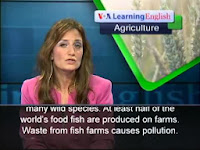From VOA Learning English, this is the Agriculture Report.
Aquaponics is a new farming method that combines growing vegetables and raising fish. The word aquaponics comes from aquaculture and hydroponics. Aquaculture means fish farming. Hydroponics means growing plants in water without soil. Supporters say this is an efficient way to produce healthy food.
At Cylburn Aquaponics Farm in Baltimore, Maryland, more than two hundred fish swim in a container called a fish tank. The tank water is rich with fish waste. That water flows through a system that filters or cleans it. Then, it flows into nearby tanks where vegetables grow. All of the farm's plants are grown directly in the treated water from the fish tanks.
Farm manager Laura Genello says that the fish provide all the nutrients the vegetables need. The roots of the plants in turn clean the water for the fish. The floating farm produces about five to 10 kilograms of vegetables a week. Ms. Genello expects to raise about 250 kilograms of fish a year. Environmentalists praise aquaponics because fishing threatens many wild species. At least half of the world's food fish are produced on farms. Waste from fish farm causes pollution.
Dave Love is a researcher at Johns Hopkins University. He notes that there are fewer and fewer fish in the ocean. He says fish farming and the waste it produces will continue. Ellen Perlman operates an aquaponics farm also near Baltimore. Her fish tanks need to be heated when the temperature drops. That costs money. It is one reason Ms. Perlman has not yet made a profit. Back at Cylburn, Laura Genello notes that aquaponics is still new and still needs improvement.
